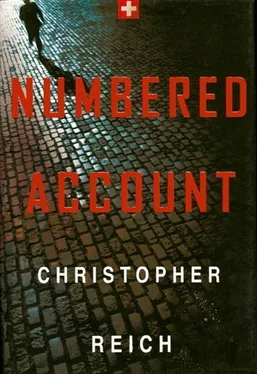The Swiss did not lionize the whistle-blower. Eight years ago, in an unprovoked fit of morality, the government had amended its legal tomes to allow any banker to report, without recourse to his superior, acts of an illegal nature he had witnessed during the hours of his employ. In those eight years, hardly more than a dozen individuals had noticed an act of criminal intent or questionable nature that necessitated a call to the authorities. The grand majority of the one hundred seventy thousand employed by the Swiss banking industry chose to remain comfortably silent.
Such a statistic spoke volumes on the politics of the Swiss people but did not begin to describe the reasons that cold-fired in Nick a notion toward willful disobedience. Those reasons could be found in the pages of his father’s calfskin agendas, now lying less than two miles away on a top shelf in his small apartment. The agendas had given Nick a way to account for the vagaries of a turbulent life, to say “the Fall” did not come because of a random act of violence. The words were brief, terse even—Bastard threatened me! I must comply. Man is a crook, out and out—and they illuminated not only his father’s miseries but his own, for Nick was unable to dwell upon his father’s death without brooding on the consequences it had unleashed on his own life. The shuttling from town to town. The new schools every five months—ten in six years, if you wanted to count. The battles to ingratiate himself with a revolving slate of classmates, the constant efforts at fitting in, until one day he just gave up and decided that he didn’t need any friends.
The drinking came later, and it was the worst. His mother wasn’t a loud drunk. She was the other kind. The teary-eyed lush content to sip one cocktail after the other. By nine in the evening she’d have a dozen stiff ones under her belt, maybe more. He’d need a crane to get her out of the BarcaLounger and into bed. Even now Nick wondered how many teenagers had put their mother naked under a cold shower. How many had made sure she had two aspirins each morning with her coffee? And how many had tucked a fresh bottle of Visine into her handbag before she went off to work so that maybe she’d last another day without being fired?
The Internal Account Surveillance List was his chance, then. A skeleton key to the unlit corridors of the bank. The question was how to use it.
The elevator jostled unevenly on its run between floors, and Nick’s mind confronted another issue. What about Thorne? asked a crusading voice he thought long dead. What about his mission to arrest the major players in the international drug trade?
Screw Thorne, he answered. Let him pursue his rogues’ gallery of drug supremos and narcotraficantes, but goddamn it, not on my watch. As far as Nick was concerned all government agencies—the CIA, the FBI, the DEA, the whole rotten bunch—operated on some hopelessly stilted agenda. They were motivated as much by the self-serving and entirely human aspirations of their leaders as by a legitimate desire to remedy societal ills. To hell with them all.
* * *
Nick returned to his desk at five minutes before three o’clock. The office seemed unnaturally quiet. Sprecher’s desk was empty, as was Cerruti’s—a desolate stretch of banking highway. He had five minutes to decide how to handle the Pasha, true identity unknown, this day at odds with the laws of at least one Western nation.
Nick tapped his pen on the Internal Account Surveillance List. He had been neglecting his duties for most of the day. To divert his thoughts, or maybe to focus them more clearly, he took out the two modification of account information forms he had filled out that morning and began making the necessary additions. A valiant trumpet sounded the charge from an imaginary battlefield. He recognized the Chairman’s air. A call to arms.
Nick hazarded a weak smile and glanced up to the clock. 14:59. And then it was done… 15:00. He slid open his top drawer and withdrew a green transfer of funds sheet and a black pen. He laid down both in front of him, sure to cover Schweitzer’s surveillance list, and began counting. One… two… three. He could practically feel the pulses of compressed light firing through the fiber-optic cables. Four… five… six.
The phone jumped in front of him. Nick stared at the flashing light. The phone rang again. He picked up the receiver and placed it firmly against his ear.
“United Swiss Bank, Mr. Neumann, good afternoon.”
Nick leaned back in his chair and repeated himself. “United Swiss Bank, Mr. Neumann speaking. How may I be of service?”
A brusque hissing erupted from the line.
“Good afternoon. Is anyone there?” His stomach felt empty. A streak of anxiety sparked in his lower abdomen and rose unchecked into his throat.
“Please come to my desert kingdom,” said a scratchy voice. “The pleasures of Allah await. I have heard you are a handsome and virile young man. We have many beautiful women, some very, very young. But for you I have reserved something special, something infinitely more pleasurable.”
“Excuse me,” Nick said. This didn’t sound like the man he had listened to on Monday.
“The pleasures of the desert are legion,” the voice rumbled on. “But for you, my young friend, I reserve my precious Fatima. Such softness you do not know. Like the down from a thousand pillows. And gentle… ahh, Fatima is a kind and loving beast. The queen of all my camels.” The voice broke down, trading its shaky Arabic accent for one of English origin. “Please you may fuck her as often as you like,” Peter Sprecher blurted out, before bursting into laughter, no longer able to continue his charade. “Am I keeping you from something more important, young Nick?”
“Bastard! You’ll pay!” Nick railed.
Sprecher laughed louder.
“Isn’t Konig keeping you busy enough? Or are you already buying shares for him? Is he going to make a bid for the entire bank?”
“Sorry, chum, I couldn’t tell you. But if I were a betting man, I wouldn’t count him out.”
“Always full of positive news…” Nick halted in mid-sentence. A new light on his telephone had begun blinking. “Gotta run. Our friend is here. By the way, his account is on Schweitzer’s surveillance list.” He caught the beginning of a loud exclamation before he stabbed the flashing extension. “United Swiss Bank, Mr. Neumann, good afternoon.”
“Mr. Sprecher, please.” It was him.
“This is Mr. Neumann speaking. Unfortunately Mr. Sprecher is away from the office today, but I am his assistant. May I help you, sir?”
“What is your bank reference?” the gravelly voice demanded. “I know Mr. Sprecher well. I do not know you. Please be so kind as to provide me your full name and bank reference.”
“Sir, I would be more than happy to provide you with information legitimizing my employ at the bank; however, first, I need to have either your name or your account number.”
The line faded for a second. The quietest of hums cut out, and then was back.
“Very well. My account number is”—he pronounced the numbers slowly and deliberately—“five four nine, six one seven. R. R.”
“Thank you. Now I require your code word for this account.”
Nick felt oddly empowered by the strict procedure set forth to control the identity of the anonymous individuals holding numbered accounts. For decades all that had been required to open an account at any Swiss bank was a check drawn on an internationally active bank, or for more discreet individuals, a stack of currency freely convertible against the Swiss franc. Proof of identity was welcome but by no means obligatory.
In 1990, Switzerland’s banking authorities, no longer willing to advocate a policy that could be viewed as favorable to the desperadoes who used banks as blind coconspirators, passed legislation calling for legitimate proof of a client’s identity and country of origin, in the form of a valid passport, to be noted as a vital part of the client’s records.
Читать дальше












